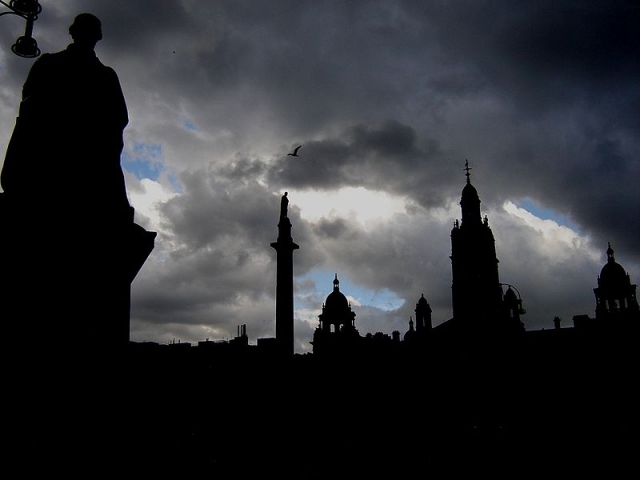George Square Restoration - transcript of Glasgow Branch lecture by Marie Davidson

Marie Davidson of Glasgow and West of Scotland Branch of the Historical Association addressed the Glasgow District Council Committee on George Square Restoration on Friday 2nd November 2012 - this is a transcript of her speech.
It is a great pleasure and privilege to speak to you at this consultation on restoring George Square - which is the heart of our City and should uphold its dignity and standing.
Before continuing, may I say firstly how delighted I am to see Baillie Cameron who gave the Historical Association an excellent paper on nineteenth century Lord Provosts a few years ago.
I say privilege having met so many people in the Square over the last eighteen months - fellow Glaswegians, French, German and Commonwealth visitors who all want to know about the statues.
Our reason for being there was that I was accompanying my husband, sketching the statues for an Historical Association funded project for 6th form pupils: the aim is- starting from local history - to learn about national history. The twelve statues are our starting point. (We hope to submit this to the new Curriculum for Excellence.)
Four of the twelve statues are local boys ‘made good' - Thomas Campbell, Lord Clyde, Sir John Moore, Dr.Graham. Others like James Watt have strong connections with Glasgow. He claimed to have thought of the condenser for his steam engine when crossing Glasgow Green.
But I have only time to mention one man represented in the Square -and one who is largely forgotten. He has fallen off the radar of our consciousness - Field Marshall Lord Clyde.
In 1943 John Patrick Kenneally won the VC - among VC's he is the only one to have won it under a false name.
Similarly Lord Clyde gave a false name enlisting in 1807 - that of Campbell, his uncle's name. He later said it was because the Duke of York misheard and has uncle did not like to give offence.
Clyde's grandfather, a Mc Liver, was out in the 45 - the Laird of Ardmore on Islay.
The estate was forfeit. His parents came to Glasgow - to John Street - where his father worked as a joiner. They were poor. Clyde supported his father for life. Like many immigrants to Glasgow, their first language was not English but Gaelic. Just as to-day many Glaswegians' parents' first language is Urdu. Glasgow has always been a city of immigrants.
Clyde had no advantages and perhaps something to conceal a Jacobite name. After all, Henry Cardinal of York was still alive, occasionally calling himself Henry 1X.
After fifty years of soldiering, the wheel turned full circle when Clyde led an army of Highlanders and Sikhs to re-take Lucknow in 1858: just like a chieftain of old leading his clan.
Finally, the Guardian printed on Tuesday - as part of his obituary - some of the writing of Eric Hobsbawn, including...
"The destruction of the past,"..."is one of the most characteristic and eerie phenomena of the late 20th century. Most young men and women at the century's end grow up in a sort of permanent present lacking any organic relation to the public past of the times they live in. This makes historians, whose business is to remember what others forget, more essential at the end of the millennium than ever before."...
And, by chance, George Square with twelve statues and Wellington nearby is a textbook of 19th century history.

